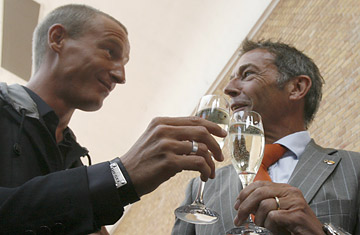
Joerg Haider, right, and his spokesman Stefan Petzner toast after a news conference in Vienna this September 8, 2008
In life, Austria's best-known far-right politician, Joerg Haider, was a media staple. In death, interest in him has skyrocketed again, thanks to the revelation that he may have been gay or bisexual.
Haider was killed in a high-speed car accident on Oct. 11. Since then, Europe's newspapers, especially those in Germany, have published stories and photographs of the leader surrounded by young men in what the newspapers call gay bars. "Was Haider Living a Double Life?" the mass-market German daily Bild blared this week. A later story showed photographs of Haider's deputy, Stefan Petzner, in low-cut jeans, a dolphin tattooed on his hip.
Even the otherwise circumspect Austrian media is broaching the topic. Newspapers there have published pictures of Haider, who was 58, partying with groups of young men, including shots from the night of his death. "Everybody knew about his sexual orientation," says Thomas Hofer, a former magazine editor who is now an independent political consultant in Vienna. "But there was a consensus in the Austrian media not to write about it."
No Austrian newspaper so far has openly declared Haider gay. But the revelations of the past two weeks are far more specific than in the past. "The Austrian press has already gone well beyond where they'd been up to now," says Hofer. "It's a crucial period for the media here."
The seemingly unwitting instigator of the latest Haider frenzy is his former spokesman and confidante Petzner. Petzner, who became acting head of the Alliance for the Future of Austria following Haider's death, held a press conference on the morning of the accident in which he repeatedly broke down in tears and referred to the loss of Haider as "the end of the world." In a subsequent interview on Austrian radio, Petzner said of Haider: "He often said to me, 'You are my lebensmensch [life partner]'. He and I know what this means, and it should stay between the two of us. I also loved him. Love can be expressed and shown in many different ways."
Several German and European commentators took Petzner's comments as confirmation of Haider's sexuality, though the party denied that his description should be taken in that way. Following the interviews, Petzner was passed over as parliamentary leader for the party. "Either he explains what was so special about his relationship with Haider, or he stops playing the role of successor and widow at the same time," blogged the editor of Austrian newspaper Die Presse, Michael Fleischhacker.
New details from the night of Haider's death have fanned media interest further. Petzner says he saw Haider the night he died; several media outlets, including website scoop.at, allege the two men quarreled. Petzner has admitted that he rode with Haider for several hundred meters in his car before getting out. Eyewitnesses at a second bar, which Haider apparently visited after leaving Petzner behind, told Austrian reporters that Haider was drinking vodka heavily. The venue was described as a gay bar by several Austrian papers. After leaving, Haider was offered a lift home but insisted on driving himself. The coroner found high levels of alcohol in Haider's blood, Petzner himself later told reporters. "It is true that Joerg Haider was intoxicated at the time of the accident," he said. (Haider's wife is demanding an independent investigation of her husband's blood-alcohol level and does not want Haider buried before those tests are done.)
While most Austrian journalists were aware of the allegations about Haider from the early 1990s, they remained reluctant to publish anything — in part, says Hofer, because however polarizing Haider's politics, his sexual orientation was not considered particularly relevant; he may have been sympathetic with former Nazis and favored anti-immigrant policies, but he never opposed gay rights. Many critics also believed that attacking him on personal grounds would only shore up his support among those who considered the media out to get him.
In fact, the current round of attention could work in the far right's favor, says Hofer. Haider was a divisive figure who once referred to the members of Nazi Germany's Waffen SS as deserving of as much honor as any German soldier, and who praised Hitler's employment policies. But the emotion and media frenzy around his death, which Hofer compares to England's trauma over the passing of Princess Diana, has distracted people from Haider's far-right legacy. Haider's party will contest elections in the province of Carinthia next spring. Few observers doubt that the party will use Haider's face on campaign posters. And few doubt that, reports of the circumstances around his death notwithstanding, the party will win.
(Click here for a photo gallery of Austria's house of horrors.)
